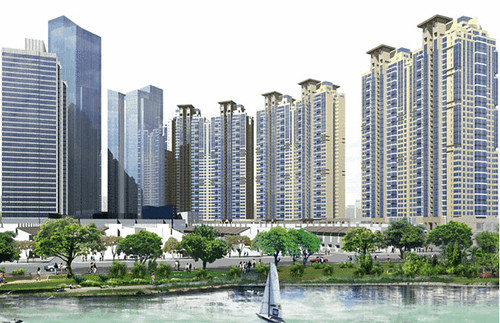Vietnam’s real estate market has yet to attract large numbers of foreign buyers more than one year after the housing regulations for foreigners took effect, although it is still considered as a potential market.

According to the regulation, individual foreigners who live and work in Vietnam can own one apartment for up to 50 years. However, most foreigners only stay in the country for a short period, so not many choose to purchase real estate.
Mark Fraser, Chief Executive Officer and Managing Lawyer of Frasers Law Company, confirmed that the Government’s regulation created favourable conditions for foreigners, but most of them only planned to stay in the country for a short time, so they had no intention of buying an apartment here.
Marc Townsend, Chief Executive Officer of CB Richard Ellis, a real estate managing and consulting company, said that although the Government had allowed some foreigners to purchase apartments since January 1, 2009, the number of foreigners who had taken advantage of the regulation had not increased. “Only a few foreigners have purchased apartments in Vietnam so far,” he said.
In addition, unwieldy administrative procedures have not helped attract foreign buyers. The procedures have caused many difficulties for foreigners, especially because they take a lot of time to complete while the sellers don’t have time to wait for the buyers to finish the administrative requirements.
“I think that the regulation is clear, but the implementation for locals is a problem. This has discouraged foreigners from investing in the real estate market,” said Fraser. He added that local staff needed training to help foreigners navigate the administrative procedures.
Foreigners are also accustomed to taking out mortgages for real estate purchases, while many domestic banks are unwilling to use this lending model for foreigners.
However, the real estate market for foreigners is still considered as a potential market. Experts have said that the number of foreign buyers will increase sharply in the near future as foreign direct investments in the country also increase.
Fraser suggested that the Government consider allowing foreigners to be permitted to purchase villas or houses in resorts as well, as this would encourage more investment in the real estate market.
Due to the difficulties listed above, most foreigners opt to rent an apartment rather than becoming owners. As a result, there has been a strong development in the leasing sector for rentals to foreigners. Even individuals have benefited from renting to foreigners.
For a 100- to 150-sqm apartment in convenient locations in the capital such as Tay Ho, Hoan Kiem and Nam Thang Long Ciputra, renters pay around US$2,000 to $4,000, even though the house only cost the owners from VND6 to VND7 billion ($315,789 to $368,421).
Nguyen Thi Hau, owner of a leased apartment on Thanh Nien Street in Hanoi, said that in three years she earned a 30 per cent return on her investment.
By Andrew Batt/ Property-Report

According to the regulation, individual foreigners who live and work in Vietnam can own one apartment for up to 50 years. However, most foreigners only stay in the country for a short period, so not many choose to purchase real estate.
Mark Fraser, Chief Executive Officer and Managing Lawyer of Frasers Law Company, confirmed that the Government’s regulation created favourable conditions for foreigners, but most of them only planned to stay in the country for a short time, so they had no intention of buying an apartment here.
Marc Townsend, Chief Executive Officer of CB Richard Ellis, a real estate managing and consulting company, said that although the Government had allowed some foreigners to purchase apartments since January 1, 2009, the number of foreigners who had taken advantage of the regulation had not increased. “Only a few foreigners have purchased apartments in Vietnam so far,” he said.
In addition, unwieldy administrative procedures have not helped attract foreign buyers. The procedures have caused many difficulties for foreigners, especially because they take a lot of time to complete while the sellers don’t have time to wait for the buyers to finish the administrative requirements.
“I think that the regulation is clear, but the implementation for locals is a problem. This has discouraged foreigners from investing in the real estate market,” said Fraser. He added that local staff needed training to help foreigners navigate the administrative procedures.
Foreigners are also accustomed to taking out mortgages for real estate purchases, while many domestic banks are unwilling to use this lending model for foreigners.
However, the real estate market for foreigners is still considered as a potential market. Experts have said that the number of foreign buyers will increase sharply in the near future as foreign direct investments in the country also increase.
Fraser suggested that the Government consider allowing foreigners to be permitted to purchase villas or houses in resorts as well, as this would encourage more investment in the real estate market.
Due to the difficulties listed above, most foreigners opt to rent an apartment rather than becoming owners. As a result, there has been a strong development in the leasing sector for rentals to foreigners. Even individuals have benefited from renting to foreigners.
For a 100- to 150-sqm apartment in convenient locations in the capital such as Tay Ho, Hoan Kiem and Nam Thang Long Ciputra, renters pay around US$2,000 to $4,000, even though the house only cost the owners from VND6 to VND7 billion ($315,789 to $368,421).
Nguyen Thi Hau, owner of a leased apartment on Thanh Nien Street in Hanoi, said that in three years she earned a 30 per cent return on her investment.
By Andrew Batt/ Property-Report

Post a Comment
Post a Comment